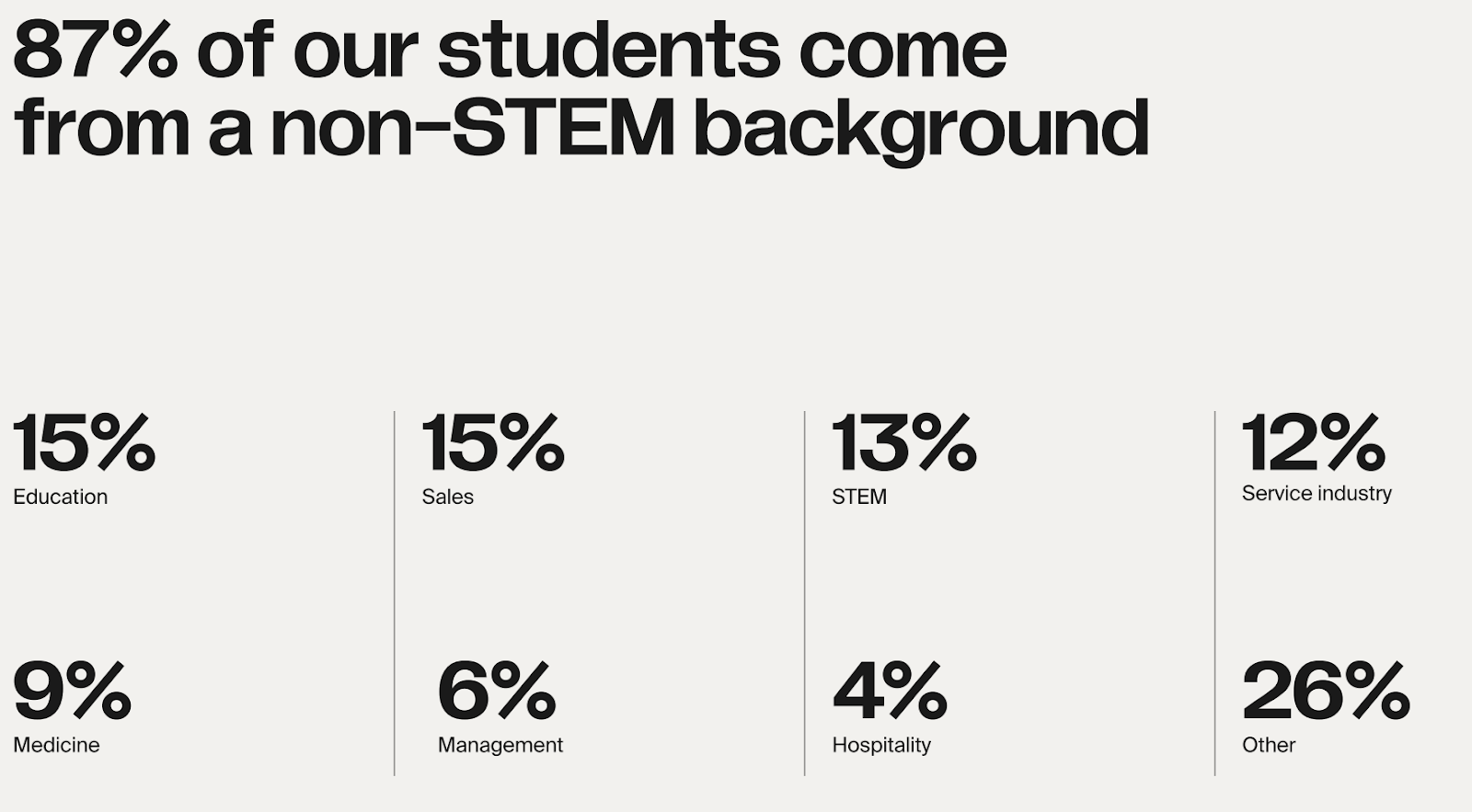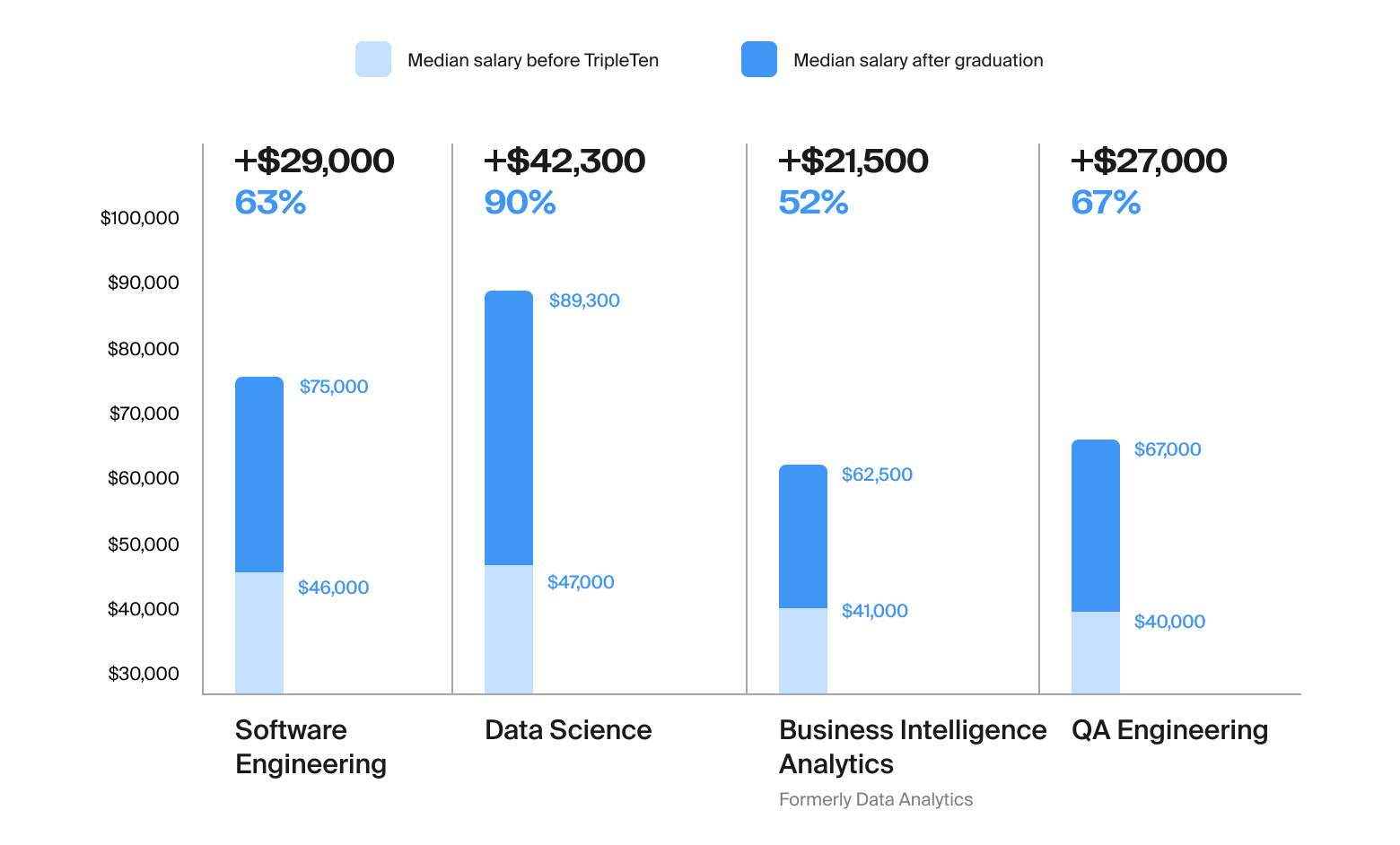You’re about to sign up for a bootcamp, or maybe your first day of class is rapidly approaching. Panic begins to set in, along with those pesky thoughts: How will I get the most out of my experience? Will I succeed at coding bootcamp tasks? What if I don’t like it? What do I do if, after all this, I don’t even graduate?
The thing to remember, first and foremost, is that the hardest part is over. You’ve taken the big leap toward making career moves — now you just have to follow through!
And doing so will be easier than you think. Below, we’ve outlined how to succeed at a coding bootcamp — and actually graduate, with a job on the way — using three tactics.
Tactic 1: Make a schedule and stick to it
Organization will be your best friend while participating in a coding bootcamp — especially if you’re balancing it alongside other responsibilities, such as parenting, a full-time or part-time role, or the job hunt.
Many students have found success creating a schedule that’s manageable and well thought out.

TripleTen graduate Jeremy Rivera came into the program with an already-booked-up calendar that included taking care of his family, finishing college, and working a job in distribution. But he didn’t see a sustainable career path in what he was doing at the time, so he decided to invest in learning more about software engineering.
Handling all these commitments, he says, came down to smart time management. “I worked my distribution job 4-5 days a week. I would leave work, drive to school, go to class at 2:30 p.m. and at 6:30 p.m., and get home around 10 p.m. before waking up at 3 a.m. to get ready for my job.”
Fitting the bootcamp comfortably into his routine, he adds, required putting aside Netflix binges or nights out — not completely, but on occasion. And the sacrifice paid off: Before even graduating, he’d landed a job running a tax education startup’s tech team.

Evgeniia Unzhakova, a former teacher, also credits her meticulous day planning with helping her complete her data science training at TripleTen without hiccups during the pandemic. “I would take a full day, close the door, and say that nothing and no one should interrupt me,” she says. Today, she’s a research analyst at the University of North Carolina at Chapel Hill.
One simple strategy for effectively keeping up with your studies? Use a paper or online calendar to mark times throughout the day purely for lessons or homework, then reward yourself for getting stuff done with something you love — snacks, a spa treatment, or your favorite TV show, for example.
Tactic 2: Ask for help
The beauty of a bootcamp — as opposed to being self-taught — is that you’re surrounded by experts and students just like you who can offer their advice and lend a hand on anything from assignments to writing a cover letter.
Leaning on this network worked for both Alex Gould and Andrew Millsaps, two successful TripleTen graduates. Alex participated in the business intelligence analytics program, where he took full advantage of TripleTen’s team of tutors.
Any time I came to a roadblock in my studies where I would have problems with syntax, maybe it was a comma, period, or semicolon that was missing, I could always rely upon the people in charge of my cohort. Alex Gould, TripleTen grad
Beyond coding assistance, his teachers guided him in his job search: “[They] would give me personal advice — how to break into a certain position and what kind of approaches would work best,” Alex adds.
Andrew similarly utilized the program’s code reviewers to check his work during his data science bootcamp. “A lot of times the code reviewer would say, ‘This code works. But here's a one line version instead of two or three lines,’” he says of the experience, adding, “In the real world, that’s how you learn things. The quickest way to learn is by getting that very targeted feedback.”
This approach led to him transitioning out of sales and into data analysis — and landing a job while still in classes. “I know it's just been just a few short months so far, but I love it,” he says of his new career.
Tactic 3: Set clear, reasonable goals
It’s tempting to shoot for the moon in your aspirations for your bootcamp experience: I want to make millions of dollars before I even graduate! I want a job I love at a major tech company with great work-life balance! I want to become a coding whiz in just a few days!
Look, we’re not saying those things can’t happen. But it’s not very encouraging to set your goals so high they feel impossible to hit. Worse, when you don’t reach them, you might lose confidence.
So it’s best to set goals that are clear, reasonable, and targeted at exactly what you need for your life and career — not what anyone else tells you you should be doing or achieving.
TripleTen’s career coaches have several pieces of advice for doing so, including:
- Focus on what you can control: The economy, job market, hiring manager’s opinions — those are out of your hands. What you can control is your input, such as the interviews you go on or connections you build. When you make those a priority, you’ll start to see your efforts pay off.
- Employ a growth mindset: Think and plan long term, and accept that not every goal you set will happen overnight.
- Make room for the personal: Not every goal has to, or should be, career-oriented. In fact, you’ll be a lot more motivated and in a better headspace to work toward those professional milestones when you’ve decompressed, chased hobbies, and spent time with loved ones.
For more goal-setting tips, check out our best practices on YouTube.
Yes, you can do it!
Seriously, you’ve got this — and we have the stats to prove it. Eight-seven percent of our students come from a non-STEM background, be it teaching, nursing, or service, and 80% identify as beginners to software development, computer science, or other tech fields.

Within 180 days of completing the program, 87% of our graduates are employed, and 50% get hired before they’re even finished — making up to $42,300 more than they did before they signed up for TripleTen.

Our students achieve these results because we don’t just focus on teaching coding; our robust team of experts and leaders cover everything from real-world applications and problem solving to resume and LinkedIn clean-up, ensuring you have the portfolio and confidence to pursue your dream tech job — and learn to code the right way.
Find out more from a TripleTen career advisor
You can book a call today to learn more about our curriculum, career placement services, and student outcomes and start your coding journey.


.avif)
.avif)
.avif)



%20(2).avif)

.jpg)

.jpg)



.avif)

